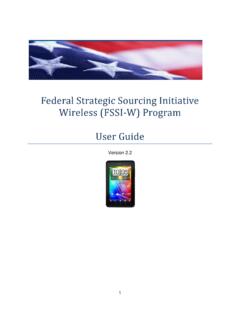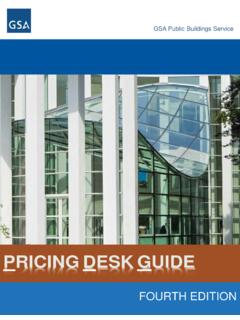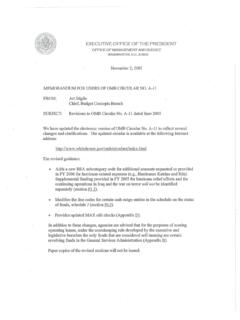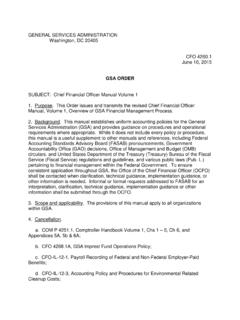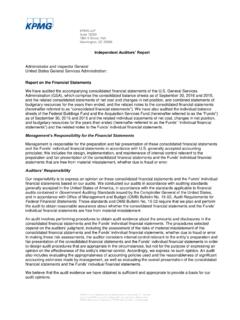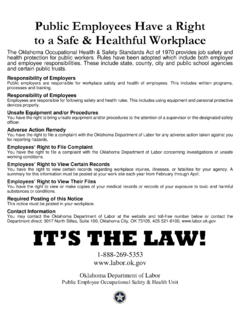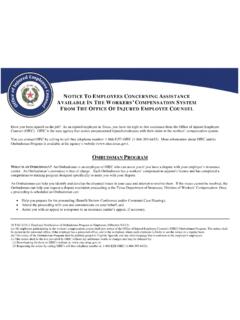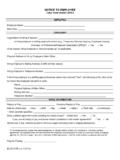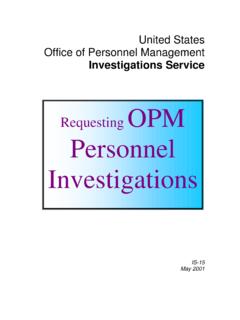Transcription of GENERAL SERVICES ADMINISTRATION Washington, DC 20405 …
1 GENERAL SERVICES ADMINISTRATION Washington, DC 20405 OAS January 28, 2015 GSA ORDER SUBJECT: Local Travel 1. Purpose. To provide guidance on the reimbursement of transportation expenses incurred on official business within the local area of an employee s official worksite/duty station or appropriate alternative worksite. 2. Background. While the Federal Travel Regulation (FTR) regulates expense reimbursement for temporary duty (TDY) travel away from the official station for GSA employees, it does not provide guidance for local travel expense reimbursement. Also, due to new policies, such as telework, the scope of local travel must be clarified. 3. Scope and applicability. This directive provides guidance for reimbursing transportation expenses incurred on official business performed near a GSA employee s official worksite/duty station. Non-GSA employees who perform local travel at the request of GSA may be reimbursed as provided by their contract or inter- and intra-government agreement, as applicable.
2 Reimbursement to non-GSA employees will be processed through the financial system, not the e-Gov Travel System (ETS). 4. Cancellation. This directive cancels chapter 7 of PFM P GSA Internal Travel Regulations and Control of Official Travel, dated August 24, 2004 (as extended). 5. Revisions. This directive limits the reimbursement of local travel expenses to the amount that exceeds an employee s daily commuting costs. It also defines commuting expense. 6. Responsibilities. The Travel Policy and Charge Card Program Office (H1BB) develops local travel policy for GSA employees. Regional offices may supplement this policy, but regional policy may not change or conflict with official policy. Regional policy must be cleared by H1BB. 7. Signature. /S/_____ CYNTHIA A. METZLER Chief Administrative SERVICES Officer Office of Administrative SERVICES OAS January 28, 2015 i TABLE OF CONTENTS 1.
3 Policy .. 1 2. Definition of local 1 3. Commuting expenses .. 1 4. Mass transit subsidies .. 1 5. Local travel areas .. 2 a. Central office employees .. 2 b. Regional employees .. 2 c. Full-time telework employees .. 2 6. Travel authorization .. 2 7. Government contractor-issued travel charge card .. 2 8. Tokens, tickets, and passes .. 2 9. Local transportation expenses .. 2 a. Government owned automobile (GOA).. 3 b. Privately owned vehicle (POV).. 3 c. Mass transit SERVICES .. 3 d. Tolls, fares, etc.. 3 e. Taxicab .. 3 10. Per diem .. 3 a. Prohibition .. 3 b. Exception for protection of human life or Federal property .. 3 11. Claiming reimbursement .. 4 Appendix: Local Travel Scenarios .. A-1 OAS January 28, 2015 1 LOCAL TRAVEL 1. Policy. Reimbursement for transportation expenses incurred by a GSA employee performing official duties near his/her worksite/duty station1 will be limited to the amount that exceeds the employee s round-trip regular commuting costs, even if that commute is not performed every day.
4 2. Definition of local travel. Local travel is travel necessary to conduct official GSA business and is performed by the most direct route within and adjacent to an employee s official worksite/duty station or appropriate alternative worksite. The proximity of travel to the employee s official worksite/duty station determines whether expenses are reimbursed as local travel expenses, as described in this policy, or as TDY travel expenses, as described in the FTR. Local travel does not include any official travel that is part of a TDY travel authorization, including travel to a common carrier terminal in the employee s local travel area in conjunction with TDY. 3. Commuting expenses. Commuting expenses are costs incurred while traveling between an employee s residence and his/her official worksite/duty station. Commuting expenses are calculated on a daily basis and are based on the method of transportation used for that day s commute.
5 For example, if an employee purchases a monthly bus pass, but chooses to drive on the day he or she conducts local travel, the employee may be reimbursed for driving expenses ( , mileage, parking, tolls), that exceed the normal commuting costs of driving from his or her residence to the official station. When computing the amount for reimbursement, expenses are considered individually, rather than in aggregate, so that all excess mileage, tolls, and parking fees are reimbursed even if certain expenses are less than normal commuting costs. The cost of the pro-rated unused bus pass is not a reimbursable expense. 4. Mass transit subsidies. The GSA Fare Subsidy Program offers qualifying employees a financial incentive to use mass transit and other options for commuting to and from work in an effort to reduce traffic congestion and dangerous pollutants in metropolitan areas. GSA employees who commute by public transportation, including subway, bus, train, or qualified vanpool, may receive "transit passes" or "fare media" through the program.
6 The subsidy is only intended to cover the costs of commuting to an 1 HCO GSA Mobility and Telework Policy paragraph 6d defines the official worksite/duty station as the location where the employee regularly performs his or her official work duties .. Designation .. must be determined on a case-by-case basis using the following considerations: (1) The official worksite is the .. place where the employee would normally work if not teleworking - as long as the employee is scheduled to report physically at least twice each biweekly pay period to that Agency worksite; (2) The official worksite for an employee who is not scheduled to report at least twice a biweekly pay period to the Agency worksite (includes virtual workers/full time teleworkers) is the location of the appropriate alternative worksite (except in certain temporary duty situations); (3) The official worksite for an employee whose work location varies on a recurring basis (mobile work), and who does not report at least twice each biweekly pay period to the Agency worksite, is the Agency worksite, as long as the employee is performing work within the same geographic area (established for the purpose of a given pay entitlement) as the Agency worksite.
7 OAS January 28, 2015 2 employee s official worksite/duty station and return to home. It is not intended to pay for local travel to/from/between other places of official business, such as travel to an offsite meeting location. 5. Local travel areas. a. Central Office employees. (1) The local travel area for Central Office employees whose official worksite/duty station is in the Washington, DC metropolitan area has been established as follows: The District of Columbia, the cities of Alexandria, Fairfax, and Falls Church in Virginia; Arlington and Fairfax Counties in Virginia; and Montgomery and Prince George's Counties in Maryland. (2) For Central Office employees whose official worksite/duty station is located in a regional office, excluding the National Capital Region office ( , satellite employee), the local travel area is established by the respective Regional Administrator.
8 B. Regional employees. Regional Administrators (RAs) will determine their region s local travel area. RAs may use a mileage radius, the corporate limits of the city or town, or the usual commuting area of the official worksite/duty station (area served by local transportation SERVICES such as buses, streetcars, subways and trains). No part of the area, however, can be more than 50 miles from where the employee regularly performs his/her duties or from an invitational traveler s residence or regular place of business. c. Full-time telework employees. Employees who telework full-time will have a local travel area of 50 miles from their residence or other appropriate alternative worksite designated as their official worksite/duty station. (HCO GSA Mobility and Telework Policy.) 6. Travel authorization. A written or electronic travel authorization will not be issued for travel solely within an employee s local travel area.
9 7. Government contractor-issued travel charge card. Travel charge cards will not be used to pay for expenses unrelated to official TDY travel, including local travel, except for situations of imminent danger to human life or Federal property. 8. Tokens, tickets and passes. In areas where mass transit SERVICES are available (subways, buses, etc.), offices should obtain tokens, tickets, and/or passes in advance with a purchase card (OAS Management and Use of the GSA SmartPay Purchase Card), to eliminate the need for reimbursing these costs via a local travel voucher. Offices should establish procedures to prevent inappropriate use of these items. 9. Local transportation expenses. Based on cost and other factors ( , distance traveled, number of travelers, urgency), employees should select the method of travel OAS January 28, 2015 3 most advantageous to the Government. Otherwise, reimbursement will be limited to the constructive amount of using the most advantageous method of travel (see examples in Appendix).
10 A. Government-owned automobile (GOA). A GOA must be used for local travel whenever available and most advantageous to the Government. b. Privately owned vehicle (POV). Local travel via POV will be reimbursed based on the actual distance traveled (as shown on the odometer), minus the employee s normal round-trip commuting distance/expenses, times the applicable mileage rate on POVs include privately owned automobiles (POA), privately owned motorcycles, and privately owned airplanes. Reimbursement will be limited to the GOA rate when a GOA was available and advantageous to the Government, but a POA is used due to the personal choice of the employee instead. c. Mass transit SERVICES . Travel between places of business via bus, subway, ferry, streetcar, etc., may be reimbursed as a transportation expense. d. Tolls, fares, etc. Parking, ferry fares, and tolls may be reimbursed as a transportation expense when their use is determined to be necessary and advantageous to the Government.
